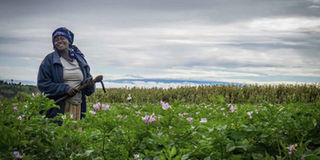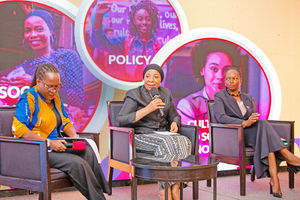Platforms to empower women most welcome

As the world celebrated International Day of Rural Women on October 15 this year, the East African Community took the opportunity to roll out an online platform designed to empower women with functional entrepreneurship. For starters, International Day of Rural Women was established by the UN General Assembly in its resolution 62/136 of December 18, 2007, with the purpose of recognising “the critical role and contribution of rural women – including indigenous women – in enhancing agricultural and rural development, improving food security and eradicating rural poverty”.
Rural women constitute a quarter of the world’s total population – 7.82 billion souls as of October this year – and who work either as farmers, wage earners or entrepreneurs. Talking of ‘entrepreneurs,’ this is wherein comes the East African Community (EAC) with its technological platform that is basically intended to provide budding women entrepreneurs with ready access to crucial information on financial and non-financial products and services.
One of the platform’s features is its ability to expose and highlight available business opportunities as and when they arise.
To that end, its creators have leveraged technologies to effectively address problems and other challenges that are already in the way – or arise and hamper human-cum-socioeconomic developmental activities.
Commenting on the subject-matter, the EAC deputy secretary general in-charge of Productive and Social Sectors, Christophe Bazivamo, said the platform will “reinforce women’s development in the region – and also create stronger, more resilient and sustainable societies...”
How most welcome the EAC platform indeed sounds. This is especially the case when Mr Bazivamo linked it with another purely African initiative that was launched late last year, and which is already operating in the name and style of ‘50 Million African Women Speak’ networking platform (50MWS).
Women’s economic empowerment
Being implemented by the EAC in collaboration with the Common Market for Eastern and Southern Africa (Comesa) and the Economic Community of the West African States (Ecowas), the 50MWS platform complements efforts and programmes intended to drive the agenda of women’s economic empowerment on the African continent.
Its professed objective is to contribute to the economic empowerment of women by enabling women-in-business to access information and financial services – thereby improving the ability of women entrepreneurs to also share accessed information on financial and non-financial products and services.
All in all, both platforms are highly commendable as a surefire way of bringing about all-inclusive regional and continental socioeconomic development using positive, highly transformative interventions.
In fact, we say that the more there are such innovative initiatives, the merrier will Society at large be. This is if only because bolstering and otherwise reinforcing women’s development creates stronger, more resilient and sustainable communities regardless.
After all, it is generally acknowledged – and rightly so acknowledged throughout history – that women have the potential to play a huge role in Society in ensuring the stability, progress and long-term development of nations.
This is more so the case with rural women whose role in agricultural production, poverty reduction and general development is unquestioned, unquestionable.
And, as they say: to educate (read ‘empower’) a woman is to educate (empower) the whole of humankind.




